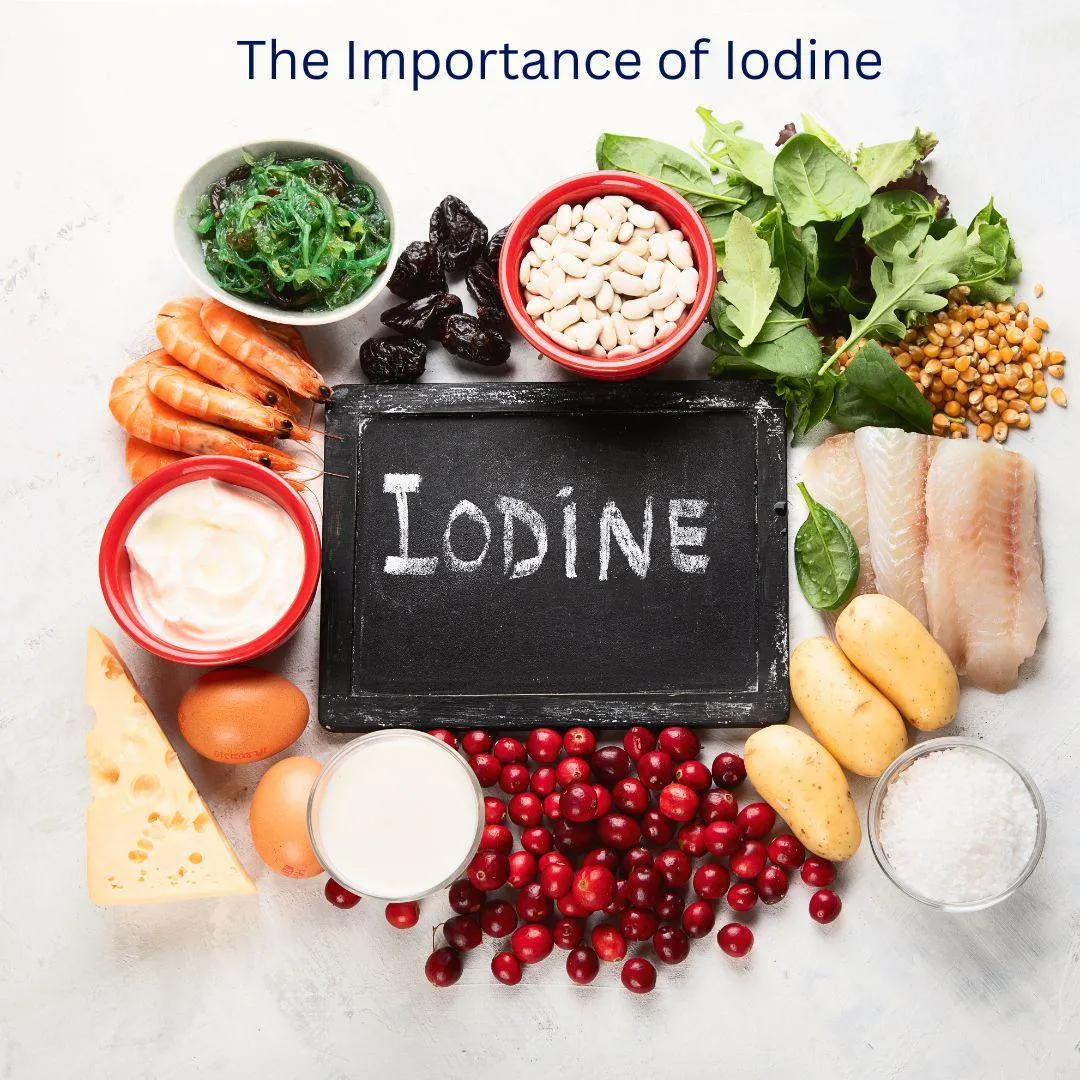*Open to Florida Residents
Blog
Blog

The Importance of Iodine on Hormones and Overall-Health
Iodine is an essential trace element that plays a crucial role in various bodily functions, particularly in hormone production and overall health. Despite its significance, iodine often does not receive the attention it deserves, especially concerning women’s health during menopause. This blog explores the importance of iodine, its role in hormonal balance, and why menopausal women must ensure they get enough of this vital nutrient.
Iodine is a chemical element required by the body in minute amounts but is essential for synthesizing thyroid hormones. These hormones, namely thyroxine T4 and triiodothyronine T3, are critical for regulating metabolism, growth, and development. Without adequate iodine, the thyroid gland cannot produce these hormones efficiently, leading to various health issues.
Iodine and Thyroid Function
The Thyroid gland, located at the base of the neck, is responsible for producing hormones that regulate the body’s metabolic rate, heart and digestive function, muscle control, brain development, and bone maintenance. Iodine is a critical component of thyroid hormones. Here is a closer look at how iodine impacts thyroid function:
Synthesis of Thyroid Hormones: Iodine combines with the amino acid tyrosine to form thyroid hormones. Without sufficient iodine, the thyroid cannot produce adequate levels of T3 and T4.
Regulation of Metabolism: Thyroid hormones play a pivotal role in regulating the body’s metabolism. They help control the rate at which cells convert nutrients into energy. An iodine deficiency can lead to a slower metabolism, resulting in weight gain and fatigue.
Development and Growth: Thyroid hormones are essential for normal growth and development, particularly in the brain and skeletal system during infancy and childhood. Iodine deficiency during pregnancy can lead to development issues in the fetus.
Symptoms of Iodine Deficiency:
Iodine deficiency can lead to various health problems, particularly those related to thyroid dysfunction. Some common symptoms include:
Goiter: An enlargement of the thyroid gland due to overstimulation by TSH (thyroid stimulating hormone) as it tries to produce thyroid hormones without enough iodine.
Hypothyroidism: A condition characterized by low levels of thyroid hormones, leading to fatigue, weight gain, and depression.
Cognitive Impairment: Iodine deficiency during pregnancy can result in mental retardation and developmental delays in children.
Hair loss: Thyroid hormones influence hair follicles, and deficiency can lead to thinning hair or hair loss.
Dry Skin and Brittle Nails: Low thyroid hormone levels can reduce the skin’s ability to sweat, leading to dry skin and brittle nails.
Iodine and Hormone Balance:
Iodine’s role extends beyond thyroid function. It is crucial for maintaining hormonal balance throughout the body, affecting various other endocrine glands and processes. Here’s how iodine impacts hormonal balance:
Estrogen Metabolism: Iodine is involved in the metabolism of estrogen, a key hormone that regulates the menstrual cycle and reproductive system. Proper iodine levels help ensure a balanced estrogen metabolism, which is particularly important during menopause when estrogen levels fluctuate.
Adrenal Function: The adrenal glands produce hormones like cortisol, aldosterone, and adrenaline. Iodine helps maintain the proper function of these glands, which is essential for stress response, blood pressure regulation, and energy levels.
Detoxification: Iodine supports the detoxification process in the liver, helping to clear excess hormones and toxins from the body, thus maintaining hormonal balance.
The Role of Iodine in Menopause:
Menopause marks a significant transition in a woman’s life, characterized by the end of menstruation and a decline in estrogen and progesterone production. This hormonal shift can lead to various symptoms, including hot flashes, night sweats, mood swings, and an increased risk of osteoporosis and cardiovascular disease. Here is why iodine is particularly important for menopausal women:
Thyroid Support: As estrogen levels decline, the risk of thyroid dysfunction increases. Adequate iodine intake helps support thyroid function, mitigating symptoms of hypothyroidism that can mimic or exacerbate menopausal symptoms.
Bone Health: Thyroid hormones are involved in bone metabolism. Proper iodine levels help maintain adequate thyroid hormone production, supporting bone health and reducing the risk of osteoporosis, a common concern during menopause.
Cardiovascular Health: Menopause is associated with an increased risk of cardiovascular disease. Thyroid hormones influence heart function and cholesterol metabolism. Ensuring adequate iodine intake supports thyroid health and, by extension, cardiovascular health.
Mood and Cognitive Function: Iodine deficiency can lead to mood disturbances and cognitive impairment. Adequate iodine supports optimal brain function and emotional well-being during menopause.
Sources of Iodine:
Ensuring sufficient iodine intake is crucial for maintaining overall health, particularly during menopause. Here are some dietary sources of iodine:
Seafood: Fish, shellfish, and seaweed are excellent sources of iodine. Kelp and other seaweeds are particularly rich in iodine.
Dairy Products: Milk, cheese, and yogurt contain iodine, largely due to the use of iodine-containing disinfectants in the dairy industry.
Iodized Salt: Table salt fortified with iodine is a convenient and common source of iodine.
Eggs: Eggs contain iodine, particularly the yolk.
Fruits and Vegetables: Certain fruits and vegetables, such as cranberries, strawberries, and potatoes, contain iodine, though the amount can vary depending on the soil in which they are grown.
Recommended Iodine Intake:
The recommended daily intake of iodine varies by age, sex and life stage. For adults, the recommended daily intake is approximately 150 micrograms. However, during pregnancy and lactation, the requirements increase to 220-290 micrograms per day. For menopausal women, maintaining a consistent intake of iodine is essential to support thyroid function and overall health.
While iodine is essential, excessive intake can also pose health risks. Excessive iodine can lead to hyperthyroidism, characterized by an overactive thyroid producing to much thyroid hormone. Symptoms include weight loss, rapid heartbeat, and nervousness. Therefore, it is important to consume iodine within recommended limits.
Integrating Iodine into Your Diet:
For menopausal women, integrating iodine into the diet can be done through various strategies:
Incorporate Seafood: Include fishlike cod, tuna, and shrimp in your meals a few times a week.
Use Iodized Salt: Ensure that the salt you use is iodized. Check labels when purchasing salt.
Enjoy Dairy Products: Include mild, yogurt, and cheese in your diet.
Eat Eggs: Incorporate eggs into your meals, whether for breakfast, lunch or dinner.
Try Seaweed: Add seaweed to soups, or as a snack.
Iodine is an essential nutrient that plays a critical role in hormone production and overall health. For menopausal women, ensuring adequate iodine intake is vital to support thyroid function, maintain bone and cardiovascular health, and promote emotional well-being. By understanding the importance of iodine and integrating iodine-rich foods into your diet, you can support your health during menopause and beyond.

The Importance of Iodine on Hormones and Overall-Health
Iodine is an essential trace element that plays a crucial role in various bodily functions, particularly in hormone production and overall health. Despite its significance, iodine often does not receive the attention it deserves, especially concerning women’s health during menopause. This blog explores the importance of iodine, its role in hormonal balance, and why menopausal women must ensure they get enough of this vital nutrient.
Iodine is a chemical element required by the body in minute amounts but is essential for synthesizing thyroid hormones. These hormones, namely thyroxine T4 and triiodothyronine T3, are critical for regulating metabolism, growth, and development. Without adequate iodine, the thyroid gland cannot produce these hormones efficiently, leading to various health issues.
Iodine and Thyroid Function
The Thyroid gland, located at the base of the neck, is responsible for producing hormones that regulate the body’s metabolic rate, heart and digestive function, muscle control, brain development, and bone maintenance. Iodine is a critical component of thyroid hormones. Here is a closer look at how iodine impacts thyroid function:
Synthesis of Thyroid Hormones: Iodine combines with the amino acid tyrosine to form thyroid hormones. Without sufficient iodine, the thyroid cannot produce adequate levels of T3 and T4.
Regulation of Metabolism: Thyroid hormones play a pivotal role in regulating the body’s metabolism. They help control the rate at which cells convert nutrients into energy. An iodine deficiency can lead to a slower metabolism, resulting in weight gain and fatigue.
Development and Growth: Thyroid hormones are essential for normal growth and development, particularly in the brain and skeletal system during infancy and childhood. Iodine deficiency during pregnancy can lead to development issues in the fetus.
Symptoms of Iodine Deficiency:
Iodine deficiency can lead to various health problems, particularly those related to thyroid dysfunction. Some common symptoms include:
Goiter: An enlargement of the thyroid gland due to overstimulation by TSH (thyroid stimulating hormone) as it tries to produce thyroid hormones without enough iodine.
Hypothyroidism: A condition characterized by low levels of thyroid hormones, leading to fatigue, weight gain, and depression.
Cognitive Impairment: Iodine deficiency during pregnancy can result in mental retardation and developmental delays in children.
Hair loss: Thyroid hormones influence hair follicles, and deficiency can lead to thinning hair or hair loss.
Dry Skin and Brittle Nails: Low thyroid hormone levels can reduce the skin’s ability to sweat, leading to dry skin and brittle nails.
Iodine and Hormone Balance:
Iodine’s role extends beyond thyroid function. It is crucial for maintaining hormonal balance throughout the body, affecting various other endocrine glands and processes. Here’s how iodine impacts hormonal balance:
Estrogen Metabolism: Iodine is involved in the metabolism of estrogen, a key hormone that regulates the menstrual cycle and reproductive system. Proper iodine levels help ensure a balanced estrogen metabolism, which is particularly important during menopause when estrogen levels fluctuate.
Adrenal Function: The adrenal glands produce hormones like cortisol, aldosterone, and adrenaline. Iodine helps maintain the proper function of these glands, which is essential for stress response, blood pressure regulation, and energy levels.
Detoxification: Iodine supports the detoxification process in the liver, helping to clear excess hormones and toxins from the body, thus maintaining hormonal balance.
The Role of Iodine in Menopause:
Menopause marks a significant transition in a woman’s life, characterized by the end of menstruation and a decline in estrogen and progesterone production. This hormonal shift can lead to various symptoms, including hot flashes, night sweats, mood swings, and an increased risk of osteoporosis and cardiovascular disease. Here is why iodine is particularly important for menopausal women:
Thyroid Support: As estrogen levels decline, the risk of thyroid dysfunction increases. Adequate iodine intake helps support thyroid function, mitigating symptoms of hypothyroidism that can mimic or exacerbate menopausal symptoms.
Bone Health: Thyroid hormones are involved in bone metabolism. Proper iodine levels help maintain adequate thyroid hormone production, supporting bone health and reducing the risk of osteoporosis, a common concern during menopause.
Cardiovascular Health: Menopause is associated with an increased risk of cardiovascular disease. Thyroid hormones influence heart function and cholesterol metabolism. Ensuring adequate iodine intake supports thyroid health and, by extension, cardiovascular health.
Mood and Cognitive Function: Iodine deficiency can lead to mood disturbances and cognitive impairment. Adequate iodine supports optimal brain function and emotional well-being during menopause.
Sources of Iodine:
Ensuring sufficient iodine intake is crucial for maintaining overall health, particularly during menopause. Here are some dietary sources of iodine:
Seafood: Fish, shellfish, and seaweed are excellent sources of iodine. Kelp and other seaweeds are particularly rich in iodine.
Dairy Products: Milk, cheese, and yogurt contain iodine, largely due to the use of iodine-containing disinfectants in the dairy industry.
Iodized Salt: Table salt fortified with iodine is a convenient and common source of iodine.
Eggs: Eggs contain iodine, particularly the yolk.
Fruits and Vegetables: Certain fruits and vegetables, such as cranberries, strawberries, and potatoes, contain iodine, though the amount can vary depending on the soil in which they are grown.
Recommended Iodine Intake:
The recommended daily intake of iodine varies by age, sex and life stage. For adults, the recommended daily intake is approximately 150 micrograms. However, during pregnancy and lactation, the requirements increase to 220-290 micrograms per day. For menopausal women, maintaining a consistent intake of iodine is essential to support thyroid function and overall health.
While iodine is essential, excessive intake can also pose health risks. Excessive iodine can lead to hyperthyroidism, characterized by an overactive thyroid producing to much thyroid hormone. Symptoms include weight loss, rapid heartbeat, and nervousness. Therefore, it is important to consume iodine within recommended limits.
Integrating Iodine into Your Diet:
For menopausal women, integrating iodine into the diet can be done through various strategies:
Incorporate Seafood: Include fishlike cod, tuna, and shrimp in your meals a few times a week.
Use Iodized Salt: Ensure that the salt you use is iodized. Check labels when purchasing salt.
Enjoy Dairy Products: Include mild, yogurt, and cheese in your diet.
Eat Eggs: Incorporate eggs into your meals, whether for breakfast, lunch or dinner.
Try Seaweed: Add seaweed to soups, or as a snack.
Iodine is an essential nutrient that plays a critical role in hormone production and overall health. For menopausal women, ensuring adequate iodine intake is vital to support thyroid function, maintain bone and cardiovascular health, and promote emotional well-being. By understanding the importance of iodine and integrating iodine-rich foods into your diet, you can support your health during menopause and beyond.
Let me help you achieve your goals.
Disclaimer: We understand that every individual's experience is unique and results may vary depending on various factors, such as attitude, adaptability, personal history, and overall health. For your safety and well-being, we highly recommend consulting your physician before beginning any program. At Elite Sexual Hormone Health, we do not diagnose, treat, or prescribe any medical or psychological disorders. We urge you to seek the care of a qualified physician or psychotherapist if you suffer from any psychological or medical disorder. Thank you for choosing Elite Sexual Hormone Health as your partner in your journey towards wellness.
© 2026, Elite Sexual Hormone Health. All rights reserved.
Privacy Policy | Terms of Service | Disclaimer
© 2026, Elite Sexual Hormone Health. All rights reserved.
Website by Hypnotherapy Accelerator





